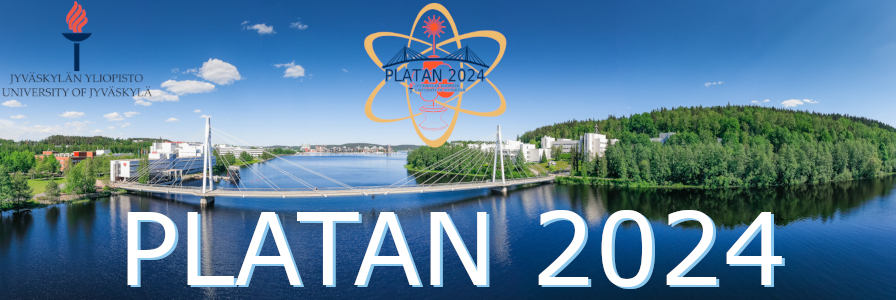Francesca Giacoppo
(GSI Helmholtzzentrum für Schwerionenforschung GmbH - Darmstadt, Germany)
Within the recent FAIR phase-0 program, the Penning-trap mass spectrometer SHIPTRAP at GSI in Darmstadt, Germany, was used to extend direct high-precision mass spectrometry to superheavy nuclides (Z≥ 104) in the vicinity of the N=152 shell closure [1].
In spite of challenging experimental conditions as long measurement times due to low production rates down to few atoms per hour, the improved efficiency, ion sensitivity and mass-resolving power allowed resolving metastable states with half-lives >200 ms from their respective ground state in No (Z=102), Lr (Z=103) and Rf (Z=104) isotopes. For the first time, isomer excitation energies in the range of ≈ 30 keV to 1.3 MeV were determined directly for these heavy nuclides. In addition, multiple metastable states in a variety of heavy isotopes, many of which are close to the Z=82, N=126 shell closures, have been measured, e.g., for isotopes of Pb, Bi, Po, At, Fr (Z=82−87), and Cf (Z=98). This allowed the direct determination of the excitation energies of long-lived isomeric states and therefore to contribute to the understanding of the level and decay schemes of these heavy nuclei, complementing the findings from decay and laser spectroscopy investigations.
This contribution focuses on the experimental challenges, the efficiency of the setup and the systematic uncertainties of the measurements.
[1] O. Kaleja et al, Phys. Rev. C 106 054325 (2022)
Francesca Giacoppo
(GSI Helmholtzzentrum für Schwerionenforschung GmbH - Darmstadt, Germany)
Brankica Andjelić
(GSI Darmstadt, Germany / Helmholtz Institut Mainz, Germany / University of Groningen, the Netherlands)
Luisa Arcila González
(University of Groningen, the Netherlands)
Joaquín Berrocal Sánchez
(Universidad de Granada)
Lennart Blaauw
(University of Groningen, the Netherlands)
Klaus Blaum
(Max Planck Society (DE))
Michael Block
Alexandre Brizard
Pierre Chauveau
(CSNSM)
Jennifer Cipagauta Mora
(University of Groningen, the Netherlands)
Stanislav Chenmarev
(MPIK Heidelberg, Germany)
Premaditya Chhetri
(Helmholtz-Institut Mainz, 55099 Mainz, Germany; GSI Helmholzzentrum für Schwerionenforschung GmbH, 64291 Darmstadt, Germany)
Christoph Düllmann
(Department Chemie - Standort TRIGA, Johannes Gutenberg - Universit ̈at Mainz, Germany; GSI Helmholtzzentrum f ̈ur Schwerionenforschung, Darmstadt, Germany; Helmoltz Institute Mainz, Mainz, Germany)
Julia Even
(University of Groningen, the Netherlands)
Dr
Manuel J. Gutiérrez
(University of Greifswald, Germany / GSI Helmholtzzentrum für Schwerionenforschung, Darmstadt, Germany / Helmholtz Institut Mainz, Germany)
Briain Hartigan
(GSI Darmstadt, Germany / University of Groningen, the Netherlands)
Fritz-Peter Heßberger
(GSI)
Nasser Kalantar-Nayestanaki
(Nuclear Energy Group, ESRIG, University of Groningen, Groningen, The Netherlands)
Oliver Kaleja
(University of Greifswald, Germany / GSI Darmstadt, Germany)
Tom Kieck
(GSI Helmholtzzentrum für Schwerionenforschung GmbH; Helmholtz Institute Mainz)
Steffen Lohse
(Helmholtz Institut Mainz, Germany / JGU Mainz, Germany)
Enrique Minaya Ramirez
(IJCLab)
Andrew Kishor Mistry
(GSI Helmholtzzentrum für Schwerionenforschung GmbH(GSI))
Sophie Morard
(IJCLab Orsay, France)
Elodie Morin
Dennis Neidherr
(GSI Darmstadt, Germany)
Steven Nothhelfer
(Helmholtz Institut Mainz)
Jaykumar Patel
(GSI Darmstadt, Germany / TU Darmstadt, Germany)
Sebastian Raeder
(GSI - Helmholtzzentrum fur Schwerionenforschung GmbH (DE))
Elisabeth Rickert
(Helmholtz Institut Mainz, Germany / JGU Mainz, Germany)
Prof.
Daniel Rodríguez
(Universidad de Granada)
Lutz Schweikhard
(University of Greifswald, Germany)
Peter Thirolf
(University of Munich (LMU))
Kenneth van Beek
(GSI Helmholzzentrum für Schwerionenforschung GmbH, 64291 Darmstadt, Germany; Technische Universität Darmstadt, 64289 Darmstadt, Germany)
Jessica Warbinek
(GSI Darmstadt)
Alexander Yakushev
(GSI Helmholtzzentrum für Schwerionenforschung GmbH)
There are no materials yet.

